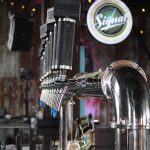
Richard Courneyea opened Signal Brewery in July 2017. Photo by Cali Doran, QNet News
By Cali Doran [1]
BELLEVILLE – The old distillery in Corbyville has been transformed into a new craft brewery.
The building, once the Corby Distillery [2], has been rehabilitated in the Signal Brewery [3].
The owner of Signal Brewery, Richard Courneyea, opened up shop last July. He purchased the building seven years ago and decided to rehabilitate the building and transform it into a craft beer operation in 2015, he said.
The building started as a grist-mill operation, established in 1812 in what was then called Hayden’s Corners. In 1855, Henry Corby Sr., a Belleville baker, purchased the mill, and in 1859 transformed it into a distillery.
According to records at the archives of the Hastings County Historical Society, Corby gained a reputation as an honest man, leading to his election as mayor of Belleville in 1867. In the same year he became a member of provincial parliament.
One of the byproducts of the distillery operation was the slops, which were sold back to farmers as livestock feed. Corby also established his own large herd of cattle and hogs that were fed the slops as a way of reducing the amount of waste from the distilling process. This continued until 1920.
In August 1881, Corby became ill and sold the distillery to his son, Henry (Harry) Corby Jr. Under his direction, the distillery grew rapidly. The town was renamed Corbyville in honour of Henry Corby Sr.

Employees of the H. Corby Distillery in June 1954. Photo courtesy of the Hastings County Historical Society Archive
The distillery employed around 430 people. Under Corby Jr.’s direction it started making and bottling its own whisky under the family name.
The company was purchased by Mortimer Davis in 1905 and renamed H. Corby Distillery Company Ltd. Two years later the building was destroyed by a fire and replaced by a new, larger facility.
In 1920, H. Corby Distillery was sold to the Canadian Industrial Alcohol Company Ltd., a holding company that became the parent organization. The company purchased J.P. Wiser’s Distillery Ltd. [4] of Prescott, Ont., and moved its operations to Corbyville. During the same decade, both J.M. Douglas and Company Limited (imported wine and spirits merchants) and Robert MacNish and Co. Limited of Scotland (a Scotch whisky producer and exporter) were acquired.
The Corby Distillery plant closed in 1991. The current owner of the building is Richard Courneyea who purchased the property six or seven years ago**, and decided to repurpose it.
“It was in bad condition when we purchased it,”said Courneyea. “It was just continually eroding. I had to make a play to save it now or have it bulldozed, so we did it and so far it has been excellent.”

The H. Corby Distillery building was restored for the Signal Brewing company. Photo by Cali Doran, QNet News
“We were mindful to the history of what was here and the architectural significance of certain aspects of it with regards to brick and stone and its proximity to the water,” he said, referring the location beside the Moira River. “So we honoured that, and our finished product is an industrial contemporary solution that I think is turning a lot of heads.”
The Signal Brewery was opened with the intention of keeping elements of the distillery building alive.
“There is an incredible amount of connection to the space,” said Courneyea. He said by rescuing the original building their are more connections. “It definitely is an emotional contact for people who used to work here and people who have had family members who worked here. It has been a touchstone for those who went before us, and we are looking to honour that and respect it by creating something really special here.”
The connection to the Corby Distillery has made the response to the brewery overwhelming, Courneyea said. “We have a lot of people that come in almost weekly that have personal connections.”
Courneyea had owned a clothing store for 24 years in downtown Belleville when he decided to get into the craft-brewing market.
“I am an entrepreneur and I was just looking for a challenge and the craft beer industry is very much on point. And you know the history that is here in regards to alcohol production is pretty incredible. So we are just leveraging that.”
He did not take on the challenge himself, he said; he enlisted the help of a team of brewing experts to get the business off the ground.


